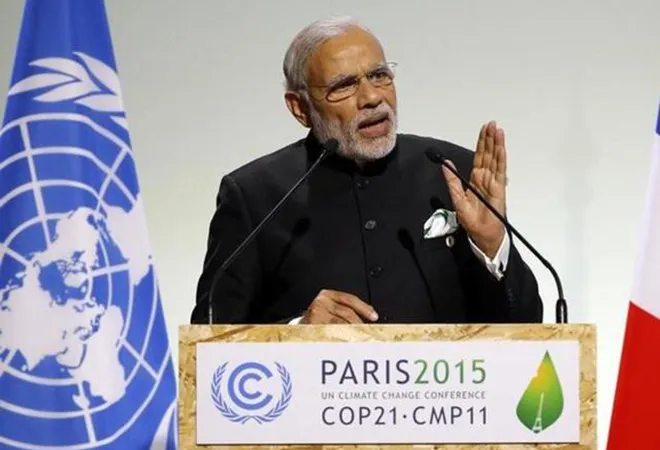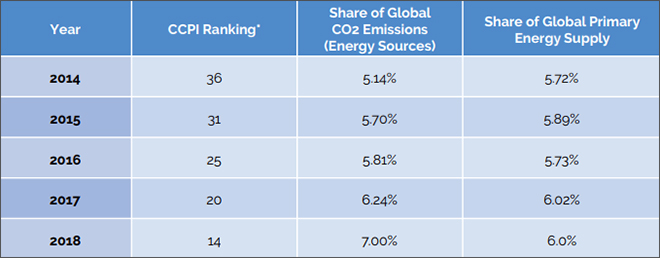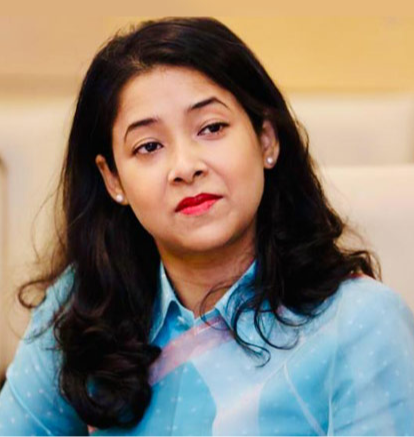-
CENTRES
Progammes & Centres
Location

Prime Minister Narendra Modi’s government has earned accolades for demonstrating leadership towards environment security and mitigating climate change. Modi himself was recently named among the 2018 “Champions of the Earth”<1> by the United Nations Environment Programme (UNEP) under the “Policy Leadership” category for his “pioneering work in championing the International Solar Alliance and promoting new areas of levels of cooperation on environmental action.” Since the withdrawal of the United States from the Paris Agreement in 2017, India has emerged as a shining example for other developing nations of “how stronger
The revised pragmatism and reformed insights of the post-2014 government on climate action was evident from the reconstitution of the Prime Minister’s Council on Climate Change aimed to “revive and streamline the council and set the agenda to deal with climate change.”<3> In the COP-20 in Lima, and then again in the COP-21 in Paris, the government stressed India’s enhanced commitment in the global fight against climate change. Subsequently, India demonstrated its will towards enhanced action in its Intended Nationally Determined Contributions (INDCs) submissions.
Indeed, India today is leading the world in the path of green energy transitions. It has embarked on an ambitious goal of achieving renewable power capacity of 227 gigawatts (GW) by the year 2022 and is committed to reducing industrial carbon intensity by 35 percent from 2005 levels.<4>,<5>
However, the energy sector, followed by agriculture continue to contribute the highest share of carbon emissions, thereby making India third among the world’s biggest emitters.<6> Ironically, despite India’s consistent improvement in Climate Change Performance Index (CCPI) rankings since 2014,<7> its contribution to global emissions has remained steady (See Table 27). In the coming years, one of the key challenges for the Modi government would be to address the gap and secure more financial as well as technological resources that could further improve the targets.
As a potential global leader in climate action, India should assume the
Table 8: India’s Climate Change Performance and Emission Scenario During Modi Government’s First Term
 *For Background and Methodology, visit https://germanwatch.org/en/2623.
*For Background and Methodology, visit https://germanwatch.org/en/2623.responsibility to ensure that countries, especially the developing ones, fully embrace a socially fair and equitable clean energy transition, while benefiting from the economic opportunities offered by such transition. While the Modi government, in the last five years, has invested in modernising its own energy infrastructure,<8> it must play a key role in mobilising significant finance for other developing countries that will help in capacity development and meet the basic energy reliability and access needs. India could use its experience to build the capacity of the regions that are in the process of developing market rules and physical infrastructure, and enable them to take advantage of the rapidly changing dynamics in global clean energy markets. India has the opportunity to encourage an energy-efficient development that ensures high penetration of renewable energy and could minimise new demand for oil or coal.
India has played a ‘responsible’ and ‘uniting’ role at the Poland negotiations ahead of the COP-24 and in defining the “rule book” for implementation of climate actions.<9> While a consensus has been drawn on measuring, reporting and verifying emissions reduction efforts and contributions to climate finance, there is still the need for finalising of rules regarding carbon market mechanisms, and preparing a long-term sustainable vision. At the plenary session of the World Economic Forum at Davos in 2018, Modi pushed for the developed world’s commitment to supply requisite technology and finances to developing countries,<10> critical for achieving success in the fight against climate change. Securing the long-term interest of the developing countries and creating a global unified response to climate change would depend on mobilising adequate finances to implement the respective countries’ mitigation and adaptation efforts.
In terms of determining progress in climate action, a majority of measures or outcomes of the global climate negotiations are mitigation-centric. As a result, adaptation measures or even for mechanisms such as the loss-and- damage receives less attention and financial support. These, however, are imperatives for the developing countries. Alongside mitigation efforts, the developing countries must ensure that their development gains are made resilient from the impacts of climate change. India should shape its foreign policy agenda on climate in such a way that enables a paradigm shift from a state-centric model of climate diplomacy, to a decentralised one that brings increased focus on specific resilience and adaption needs of various communities in the developing and least developed countries.
The international politics of climate change is built on ‘material’ structures, ‘anarchic’ principles and ‘power’ politics.<11> Such a system is harmful for efforts and collective actions for climate change mitigations and adaptation that requires the bridging of financial and technological gaps between countries. While the global community is increasing efforts towards deepening cooperation on climate action, there is still a divide along geopolitical and geo- economic lines, such as the United States’ regression from climate action, thereby impacting collective progress in climate action.
In the coming years, India has the opportunity to draw a fresh framework that reflects contextual efforts at local, regional and national levels on the projected risks and policy requirements. Such a framework should be geared towards securing the interests and voices of the most affected communities. Ensuring a strong bottom-up policy framework and highlighting it in the international stage can transform the nature of global climate politics. While such a policy pathway is in progress through the Paris Agreement, however, there is a need for more concerted approach to bolster and sustain the efforts. This is especially required in developing countries where the socio-economic, political and ecological variables are less clear. As a country leading the global climate governance, India in the coming years must create frameworks for the rest of the developing economies to foster climate compatible development, and lead energy transitions while ensuring reduced socio-economic disparities and technological divide.
This article originally appeared in special report Looking Back looking Ahead.
<1> PTI, “PM Modi Conferred UN’S Highest Environmental Honour”, Hindustan Times, 27 September 2018.
<2> Aparna Roy, “Only India Can Save The Paris Climate Agreement”, Hindustan Times, 15 June 2017.
<3> Meena Menon, “PM’S Climate Change Council Recast”, The Hindu, 5 November 2014.
<4> FE Bureau, “India Has Embarked Upon an Ambitious Plan to Install 227 GW of Renewable Energy by 2022”, The Financial Express, 28 June 2018.
<5> Lalit K. Jha, “India Commits 33-35 Per Cent Cut in Carbon Emissions By 2030”, Business Today, 15 November 2017.
<6> Special Correspondent, “’India Third Largest Contributor to Carbon Emission’”, The Hindu, 6 December 2018.
<7> “Climate Change Performance Index”, Germanwatch, 10 December 2018.
<8> Tim Buckley and Kashish Shah, “India’s Grid Transmission Infrastructure Needs Further Modernisation, Urgently”, Institute of Energy Economics and Financial Analysis, 22 January 2019.
<9> PTI, “India to Play Responsible Role at Climate Negotiations in Poland: Modi To UN Chief”, Livemint, 20 November 2018.
<10> “Prime Minister’s Statement on the Subject ‘Creating a Shared Future in a Fractured Word’ in the World Economic Forum (January 23, 2018)”, Ministry of External Affairs, Government of India, 23 January 2018,
<11> Dhanasree Jayaram, “In 2019, Climate Diplomacy Needs to Challenge ‘Systemic’ Politics”, Climate Diplomacy, 11 March 2019.
The views expressed above belong to the author(s). ORF research and analyses now available on Telegram! Click here to access our curated content — blogs, longforms and interviews.

Aparna Roy is a Fellow and Lead Climate Change and Energy at the Centre for New Economic Diplomacy (CNED). Aparna's primary research focus is on ...
Read More +